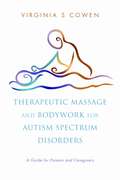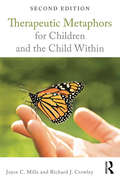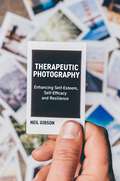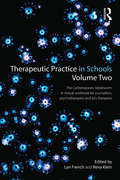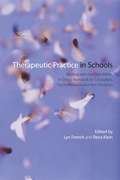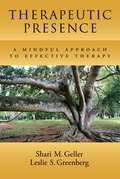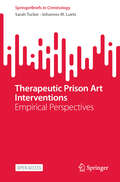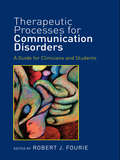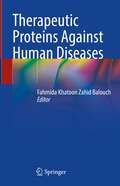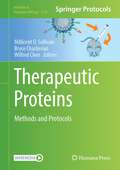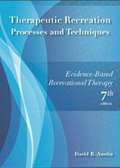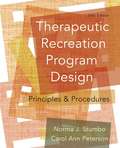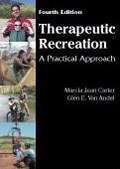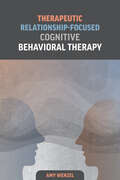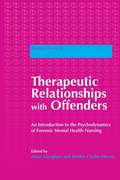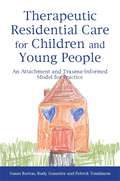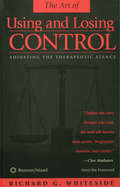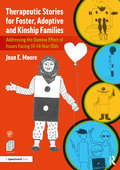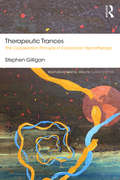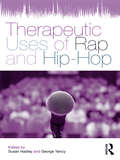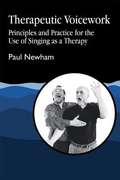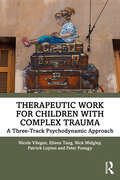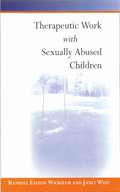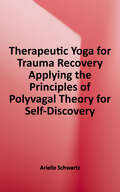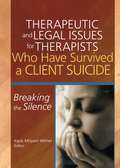- Table View
- List View
Therapeutic Massage and Bodywork for Autism Spectrum Disorders: A Guide for Parents and Caregivers
by Virginia S. CowenMassage techniques are widely and effectively used in the treatment of autism spectrum disorders (ASDs) to address sensory issues, motor problems and touch receptivity. However, the variety of different styles of massage available often leaves parents baffled and unsure about which touch therapy treatment is best for their child. This practical guide explains how massage works, how the body senses touch, and how touch therapy can benefit children with ASDs. It describes exactly what each type of massage entails. Covering anatomy-oriented massages, energy-based massages and therapeutic bodywork, this is the book that helps readers tell Reiki from reflexology, a Swedish from a sports massage, or tuina from a Thai massage. With recommendations for selecting the right style of massage, advice on locating a practitioner, and tips on preparing a child with an ASD for massage, this is the perfect resource to find a therapy - or combination of therapies - to suit each individual child. This book will be essential reading for all parents and caregivers interested in the benefits of therapeutic massage and bodywork for children and adolescents with ASDs, and practitioners looking at alternatives for therapeutic intervention.
Therapeutic Metaphors for Children and the Child Within
by Joyce C. Mills Richard J. CrowleyWinner of the 1988 Clark Vincent Award for an "outstanding contribution to the profession through a literary work" and translated into four languages, the original edition of Therapeutic Metaphors for Children and the Child Within was considered a groundbreaking addition to the field of child and adolescent psychotherapy. The 1986 edition was the first—and to this day the only—book that solely intertwines the extraordinary foundational teachings and philosophies of Milton H. Erickson and creative healing approaches for children and adolescents. With resiliency at its core, this revision now brings forward important topics related to neurobiology and cultural value of metaphor and play, along with fresh case examples and creative activities to a new generation of mental health, education, and coaching professionals.
Therapeutic Photography: Enhancing Self-Esteem, Self-Efficacy and Resilience
by Neil GibsonTherapeutic photography is an increasingly popular approach for increasing self-esteem, resilience and self-reliance in a wide range of people, including those with dementia, autism or mental health problems, school children and offenders. This book provides practical guidance on delivering therapeutic photography interventions and introduces the theory underpinning the approach.Each chapter describes a different element of therapeutic photography, including storytelling through photographs to discuss relationships and the use of self-portraits and selfies to explore identity. Exercises, reflection points and examples are provided throughout and a detailed case study shows the approaches described in the book used with a group of young adults on the autism spectrum. An adaptable programme is also included in the appendix.
Therapeutic Practice in Schools Volume Two: The Contemporary Adolescent:A Clinical Workbook for counsellors, psychotherapists and arts therapists
by Lyn French Reva KleinIn common with Therapeutic Practice in Schools: Working with the Child Within (Routledge 2012), this second volume serves as a practical handbook for school-based counsellors, psychotherapists, arts therapists and play therapists working with young people. Written in accessible language, it is eminently applicable to the practice of both qualified and trainee therapists. Therapeutic Practice in Schools: The Contemporary Adolescent begins with an overview of key psychoanalytic ideas informing our understanding of adolescence before moving on to focus on life circumstances and issues which commonly bring young people to the therapist’s consulting room in the school. Dedicated chapters on key themes including identity, relationships, sex and sexuality, anger issues, self-harm, bereavement and bullying aim to deepen our understanding of the adolescent experience while also providing the therapist with invaluable insights into what one might say in the ‘here and now’ of the session. Chapter authors, all with considerable experience in the field, discuss approaches to sustaining the therapeutic relationship in the face of ambivalence or defiant resistance as well as thinking about the impact of social media on all aspects of adolescent development. The advantages and limitations of working with adolescents in the educational setting where school staff will have their own reasons for referring students for therapy, while the young people themselves might come with a very different agenda, are also covered. It is widely acknowledged that engaging troubled or troublesome adolescents in therapy can make an enormous difference to their lives. This book ensures that both trainee and qualified therapists are supported in the often daunting yet ever stimulating and enlivening task of working with young people in the school setting.
Therapeutic Practice in Schools: Working with the Child Within: A Clinical Workbook for Counsellors, Psychotherapists and Arts Therapists
by Lyn French Reva KleinThis book is an indispensable guide to providing therapy services for children and adolescents in primary and secondary school settings. The contributors have extensive experience in the field and carefully examine every aspect of the work, ranging from developing an understanding of the school context in all its complexity, through to what to say and do in challenging therapy sessions and in meetings with school staff or parents and carers. Therapeutic Practice in Schools opens with an overview of key psychoanalytic concepts informing therapy practice. This is followed by a detailed exploration of the hopes and anxieties raised by providing therapy in schools, the factors that either enable or impede the therapist's work and how to manage expectations as well as measure outcomes. The practical aspects of delivering therapy sessions are also covered, from the initial assessment phase through recognising and working with anxieties, defences, transference and counter-transference to working with endings. An awareness of the impact of social identity, gender, race and culture on both the therapist and client is woven into the book and is also discussed in depth in a dedicated chapter. The manual offers a comprehensive yet highly readable guide to the complex world of school-based therapy. It provides practical examples of how therapists translate theory into everyday language that can be understood by their young clients, ensuring that trainees starting a placement in schools, as well as therapists beginning work in the educational setting for the first time, are able to take up their role with confidence.
Therapeutic Presence: A Mindful Approach to Effective Therapy
by Shari M. Geller Leslie S. GreenbergTherapeutic presence is the state of having one's whole self in the encounter with a client by being completely in the moment on a multiplicity of levels -- physically, emotionally, cognitively, and spiritually. Present therapists become aware of both their own experience and that of their client through bodily sensations and emotions, and this awareness helps them to connect deeply with the client. Therapeutic presence is not a replacement for technique, but rather a foundational therapeutic stance that supports deep listening and understanding of the client in the moment. Geller and Greenberg present their empirically based model of therapeutic presence that integrates three aspects of the concept: how present therapists prepare for presence both pre-session and in general life, what activities therapists engage in when being therapeutically present, and what in-session presence feels like. The authors also provide a therapeutic presence theory of relationship based on research and clinical wisdom. Importantly, because presence is a learnable state that can be cultivated with practice and commitment, the authors infuse the book with practical, experiential exercises for cultivating presence.
Therapeutic Prison Art Interventions: Empirical Perspectives (SpringerBriefs in Criminology)
by Sarah Tucker Johannes M. LuetzThis book is an Open Access book. This book discusses engaging prisoners in therapeutic art. It has been prepared for an academic and professional readership and has policy implications for prison governance worldwide. Following years of piloting research, the book presents a prototype for sensitively attuned art therapy delivery that promises new pathways for prisoner rehabilitation. The book is grounded in empirical inquiry, rests on a unique triangulated methodology, and presents results that are informed by the experience of acquiring artistry in incarceration. It also features data from a public art exhibition showcasing prisoner art generated &‘on the inside&’. Offering recommendations for research, policy and practice, this book will be a welcome resource for researchers, art therapists, chaplaincy and parole services, criminologists, and policymakers, among others.
Therapeutic Processes for Communication Disorders: A Guide for Clinicians and Students
by Robert J. FourieWhy do many people with disorders of communication experience a sense of demoralization? Do these subjective experiences have any bearing on how such problems should be treated? How can professionals dealing with speech, language, hearing and other communication disorders analyse and respond to the subjective and relational needs of clients with such problems? In this book, authors in the fields of communication disorders analyse the psychological, social and linguistic processes and interactions that underpin clinical practice, from both client and clinician perspectives. The chapters demonstrate how it is possible to analyze and understand client-clinician discourse using qualitative research, and describe various challenges to establishing relationships such as cultural, gender and age differences. The authors go on to describe self-care processes, the therapeutic use of the self, and various psychological factors that could be important for developing therapeutic relationships. Also covered are the rarely considered topics of spirituality and transpersonal issues, which may at times be relevant to clinicians working with clients who have debilitating, degenerative and terminal illnesses associated with certain communication disorders. While this book is geared toward the needs of practicing and training speech, language and hearing clinicians, other professional such as teachers of the deaf, psychotherapists, nurses, and occupational therapists will find the ideas relevant, interesting and easily translatable for use in their own clinical practice.
Therapeutic Proteins Against Human Diseases
by Fahmida Khatoon Zahid BalouchThis book compiles updated research about the implications of therapeutic proteins in various human diseases. The initial chapters of the book provide basic information on the therapeutic proteins and discuss techniques for their formulation, production, and analytic approaches for their characterization. The subsequent chapters shed light on therapies based on therapeutic proteins against metabolic disorders, neurological disorders, cancer, autoimmune disorders, and infectious diseases. Importantly, it presents the factors influencing the immunogenicity of therapeutic proteins, including, genetic factors, disease type, and origin of therapeutic protein, dose frequency, administration route, and treatment duration. The book also reviews the strategies for reducing immunogenicity associated with therapeutic proteins, including PEGylation, site specific mutagenesis, exon shuffling, and humanizing of monoclonal antibodies. Further, it presents strategies for improving the typical drawback associated with protein therapeutics including instability and limited penetration through biological barriers. This book covers various computational methods that are commonly used for designing therapeutic proteins and in silico method for predicting and improving in vivo efficacy of the therapeutic molecules. Lastly, the book highlights the recent advances in developing nanosized delivery systems to improve safety and efficacy of protein therapeutics.This book caters to students and researchers of medicinal chemistry, pharmaceutical sciences and therapeutics. It is also useful to clinicians working with therapeutic proteins.
Therapeutic Proteins: Methods and Protocols (Methods in Molecular Biology #2720)
by Millicent O. Sullivan Bryce Chackerian Wilfred ChenThis volume covers the latest key aspects of therapeutic protein applications. Chapters in this book cover topics such as the discovery, production, and conjugation of protein-proteins with discussions on the direction of future development and advancements; ways to use these engineering proteins for therapeutic and vaccine applications; and the use of modified protein nanocarriers. Written in the highly successful Methods in Molecular Biology series format, chapters include introductions to their respective topics, lists of the necessary materials and reagents, step-by-step, readily reproducible laboratory protocols, and tips on troubleshooting and avoiding known pitfalls.Cutting-edge and practical, Therapeutic Proteins: Methods and Protocols is a valuable resource for any researcher who are interested in learning more about the field of therapeutic proteins.
Therapeutic Recreation Processes & Techniques: Evidenced-Based Recreational Therapy
by David R. AustinIn fact, the subtitle, "Evidence-Based Recreational Therapy", has been added to emphasise the importance of evidence-based practice in recreational therapy. Today recreational therapists must possess a broad knowledge base that offers them a foundation for practice. This book explores how to practice recreational therapy yet provides theoretical and empirical evidence to support practice.
Therapeutic Recreation Program Design: Principles And Procedures
by Norma J. Stumbo Carol Ann PetersonTherapeutic Recreation Program Design uses the most up-to-date information and powerful study tools to help readers learn how to synthesize different elements of therapeutic recreation into one cohesive program. The Fifth Edition features an improved organization that guides students through the theory and practice of therapeutic recreation programming in a way that fully prepares them to work effectively in the industry. <p><p> Conceptual Foundations: The Basis for Service Development and Delivery, The Leisure Ability Model, Therapeutic Recreation Services: Important Considerations, Therapeutic Recreation Accountability Model, Comprehensive Program Design, Specific Program Design, Activity Analysis, Activity Selection and Implementation, Treatment and Diagnostic Protocols, Client Assessment, Client Documentation, Program and Client Evaluation, Professionalism and Accountability: Challenges for the Future. Intended for those interested in learning the basics of therapeutic recreation program design.
Therapeutic Recreation: A Practical Approach (Fourth Edition)
by Marcia Jean Carter Glen E. Van AndelThe fourth edition of Therapeutic Recreation: A Practical Approach reflects the still-evolving nature of this health-care profession and practice in a diverse global world. Social, cultural, demographic, and economic shifts, as well as technological advancements, have created demand for fiscal accountability by informed consumers/clients who expect safe, quality health and human services that are reliable, responsive to their needs, and have proven benefits. Thus our intention is to provide, in a practical, student-oriented fashion, a comprehensive overview of the fundamentals of therapeutic recreation as a health and human service profession and as a career choice. This revised edition is primarily designed for an introductory course in therapeutic recreation at the undergraduate level. Students majoring in health and human service programs or recreation may also find the text useful, particularly if they anticipate careers in health-care settings and agencies that offer inclusionary programs.
Therapeutic Relationship-Focused Cognitive Behavioral Therapy
by Amy Wenzel PhDThis book describes a relationship-focused approach to the conduct of cognitive behavioral therapy (CBT) called therapeutic relationship-focused CBT, offering readers a broad conceptualization of the therapeutic relationship by integrating literature that cuts across theoretical frameworks, and applies this conceptualization to illustrate how the therapeutic relationship can be used as both a facilitator of change as well as a central agent of change within the cognitive behavioral framework. In addition to acknowledging important theoretical and empirical scholarship on the therapeutic relationship that has been advanced by renowned CBT scholars, the book highlights and integrates important insights from scholars who operate outside of the cognitive behavioral framework. In addition, it provides clinical guidance for developing, maintaining, and enhancing the therapeutic relationship throughout the course of CBT, and provides case illustrations to support the notion that some of the very best CBT occurs in the context of an issue happening in real time, in session, within the therapeutic relationship. Chapters emphasize that the incorporation of a focus on the therapeutic relationship in CBT has the potential to enhance outcomes and promote treatment engagement for clients. The volume is divided into two parts. The first part on contextual foundations describes theory, discourse, empirical research, and some clinical applications of general aspects of the therapeutic relationship. Part two of the book summarizes clinical guidance for the implementation of therapeutic relationship-focused CBT, showing how the therapeutic relationship can facilitate CBT techniques like cognitive restructuring, social problem solving, exposure, and schema modification. The author discusses how to address sensitive issues that may not typically be addressed in the CBT literature, such as negative client reactions to therapists and vice versa. Guidance for repairing ruptures in the working alliance and ending therapy is also provided. Together, the volume presents a vivid description of a therapeutic relationship-focused CBT that brings together key scholarly advancements on the therapeutic relationship, translates them into clinical guidance, and establishes a foundation for future empirical research and clinical practice.
Therapeutic Relationships with Offenders: An Introduction to the Psychodynamics of Forensic Mental Health Nursing
by Gwen Adshead Tom Clarke Anne Aiyegbusi Valerie Anne Brown Jenifer Clarke-MooreWorking in any area of mental health nursing presents complex issues regarding the nurse-patient relationship. For those working in prolonged clinical contact with offenders, relationships with patients and colleagues can be particularly emotionally intense and sometimes difficult to express. This book attempts to understand and articulate the emotional labour of forensic nursing and explores the challenge of establishing and maintaining therapeutic relationships with offenders. The first book to consider the emotional and relational component of forensic mental health nursing, the chapters cover a number of specialist forensic areas from this psychodynamic perspective, such as women's services, services for people with personality disorders, intensive care, high security psychiatric hospitals, medium secure units and services for adolescent offenders. A chapter on therapeutic communities is also included, along with chapters on challenging relational phenomena such as working with hate and the difficulties of managing difference when working in environments that produce high levels of anxiety. Therapeutic Relationships with Offenders provides essential information for mental health nurses working in the forensic field and will be of interest to any professionals working with challenging populations and people with personality disorders.
Therapeutic Residential Care for Children and Young People: An Attachment and Trauma-Informed Model for Practice
by Patrick Tomlinson Susan Barton Rudy GonzalezChildren and young people in care who have been traumatized need a therapeutic environment where they can heal and which meets their emotional and developmental needs. This book provides a model of care for traumatized children and young people, based on theory and practice experience pioneered at the Lighthouse Foundation, Australia. The authors explain the impact of trauma on child development, drawing on psychodynamic, attachment and neurobiological trauma theories. The practical aspects of undertaking therapeutic care are then outlined, covering everything from forming therapeutic relationships to the importance of the home environment and daily routines. The book considers the totality of the child's experience at the individual, group, organization and community levels and argues that attention to all of these is essential if the child is to achieve wellness. Case material from both children and carers are used throughout to illustrate both the impact of trauma and how children have been helped to recovery through therapeutic care. This book will provide anyone caring for traumatized children and young people in a residential setting with both the understanding and the practical knowledge to help children recover. It will be essential reading for managers and decision-makers responsible for looked after children, child care workers such as residential and foster carers, youth workers, social workers, mental health workers and child welfare academics.
Therapeutic Stances: Adjusting The Therapeutic Stance
by Richard G. WhitesidePublished in 1997, Therapeutic Stances: The Art Of Using And Losing Control is a valuable contribution to the field of Psychotherapy.
Therapeutic Stories for Foster, Adoptive and Kinship Families: Addressing the Domino Effect of Issues Facing 10–14-Year-Olds
by Joan E. MooreThis accessible resource contains therapeutic stories and guidance for adults who are supporting young people aged 10–14 in foster, adoptive or kinship families. With a solution-focused approach, the stories are designed to address a range of social and emotional problems, covering topics such as bullying, eating disorders, trauma, parents’ health, homophobia and racism. Each story is accompanied by relevant context and theory, discussion points and creative activities that will stimulate the young person’s problem-solving skills and imagination, empowering them to explore solutions to situations in their own lives. Key features include: 35 therapeutic stories created to help young people make sense of their experiences, illustrating empathetic responses and solutions to social and emotional difficulties. Discussion points and related activities based on the author’s extensive practical experience and knowledge. Practice guidelines and case studies to illustrate how the story-making approach can be used by therapists, adoptive parents, social workers and teachers. Photocopiable and downloadable resources. This book will enable foster, adoptive and kinship parents, social workers, therapists, teachers and other professionals to support the young people with whom they are working to resolve their dilemmas and enhance their self-esteem.
Therapeutic Trances: The Cooperation Principle in Ericksonian Hypnotherapy (Routledge Mental Health Classic Editions)
by Stephen GilliganTherapeutic Trances is a manifesto of the fundamental principles and techniques of Ericksonian hypnotherapy. This innovative volume lays out the principles and practice of developing relationships with patients and creating a hypnotic environment in which true healing can take place. The book offers therapists specific questions to ask and practical ideas to pursue, thereby illustrating how therapists may cooperate with clients to translate problems into solutions. Stephen Gilligan synthesizes the approaches of Erickson, Bandler & Grinder, and Bateson to bring a new perspective to the field.
Therapeutic Uses of Rap and Hip-Hop
by Susan Hadley George YancyIn perceiving all rap and hip-hop music as violent, misogynistic, and sexually charged, are we denying the way in which it is attentive to the lived experiences, both positive and negative, of many therapy clients? This question is explored in great depth in this anthology, the first to examine the use of this musical genre in the therapeutic context. The contributors are all experienced therapists who examine the multiple ways that rap and hip-hop can be used in therapy by listening and discussing, performing, creating, or improvising.The text is divided into three sections that explore the historical and theoretical perspectives of rap and hip-hop in therapy, describe the first-hand experiences of using the music with at-risk youth, and discuss the ways in which contributors have used rap and hip-hop with clients with specific diagnoses, respectively.Within these sections, the contributors provide rationale for the use of rap and hip-hop in therapy and encourage therapists to validate the experiences for those for whom rap music is a significant mode of expression. Editors Susan Hadley and George Yancy go beyond promoting culturally competent therapy to creating a paradigm shift in the field, one that speaks to the problematic ways in which rap and hip-hop have been dismissed as expressive of meaningless violence and of little social value. More than providing tools to incorporate rap into therapy, this text enhances the therapist's cultural and professional repertoire.
Therapeutic Voicework: Principles and Practice for the Use of Singing as a Therapy
by Paul NewhamNewham explores both the theory and practice behind the use of voice and singing in expressive arts therapy by drawing together ideas from various disciplines.
Therapeutic Work for Children with Complex Trauma: A Three-Track Psychodynamic Approach
by Peter Fonagy Patrick Luyten Nick Midgley Nicole Vliegen Eileen TangTherapeutic Work for Children with Complex Trauma offers a contemporary three-track psychodynamic treatment model to mental health professionals working with traumatised children and their caregivers. The book provides a contemporary and comprehensive approach to working with traumatised children by integrating knowledge and skills from traditional psychodynamic child psychotherapy and more contemporary trauma-informed and mentalization-based frameworks. It advocates three tracks of work, involving direct work with the child, work with the child’s primary caregivers and work with the network. The book is divided into two parts: Part I of the book covers the theoretical background and Part II discusses the core components and phases of the trauma-informed and mentalization-based treatment approach. The authors bring out the specific dynamics of the psychotherapeutic work through four composite cases woven through the book. Written in accessible language this treatment guide is primarily aimed at psychodynamically trained psychotherapists, mental health professionals and professional caregivers working with traumatised children.
Therapeutic Work with Sexually Abused Children
by Janet West Randall Easton Wickham`This book is a practical and supportive guide for the professionals facing this traumatic subject. [It] is easily readable′ - Journal of Child and Adolescent Mental Health `Therapeutic Work With Sexually Abused Children locates the practice experience of the authors within a rigorous theoretical framework and is a readable and useable guide to the complexities of helping children and adolescents who have suffered the trauma of sexual abuse′ - Youth & Policy `It is refreshing to find child therapists ready to engage with sexually abused children by incorporating trauma theory and research, addressing child protection and seeing themselves as part of a team that includes the carers. The authors provide an overview of phases of treatment, theoretical considerations and essential skills. They emphasize the importance of relationship and explore its impact on the therapist. Their approach is creative and child-centered. Case vignettes, poems and exercises promote empathy with the child′s perspective. There is a useful chapter on cultural issues and the needs of children in alternative care... this is an excellent primer for the child′s helping network′ - Community Care `This is an excellent book for workers seeking to respond more effectively to child victims of abuse′ - David Pearson, Caring Magazine Therapeutic Work with Sexually Abused Children is a creative and practical guide for professionals working directly with those who have suffered sexual abuse and for their carers. The trauma of sexual abuse experienced in childhood can be severe and enduring. Therapeutic support is offered to help both the child and the family cope with psychological or emotional difficulties both currently and in later life. Therapists must be able to respond effectively to the child victim in a sensitive and timely way which prioritizes the needs of each child. Drawing on their experience as practitioners, the authors explore the reactions which children commonly experience following abuse and examine the tasks of the therapist in responding to them. This book explores the counselling of children who have been abused rather than adult survivors of child abuse. The book will benefit from the combined experiences of one US author and one UK author.
Therapeutic Yoga for Trauma Recovery: Applying the Principles of Polyvagal Theory for Self-Discovery, Embodied Healing, and Meaningful Change
by Arielle SchwartzTrauma recovery is as much about healing the body as it is the mind. Yet, so often, the focus of healing involvesretelling the story of the pastwithout addressing the physiological imbalances that trauma leaves in its wake. This book bridges this path of healing between the psyche and the body by walking you through the sacred practice of yoga so you can release the burdens of trauma from your body and mind.Grounded within the principles of polyvagal theory, affective neuroscience, and trauma-informed care, this book will help you gain a better understanding of how our brains and bodies respond to stress and trauma and offer a self-led healing journey toward feeling more empowered, grounded, clearheaded, inspired, and at ease. With her innately compassionate and gentle guidance, Dr. Arielle Schwartz introduces you to the power of the yogic philosophy and offers a variety of accessible yoga poses and breathing practices that will allow you to:-Nourish your nervous system -Reconnect with your body -Ground yourself in the present moment -Release unresolved patterns of fight, flight, freeze, or faint -Widen your ability to tolerate emotional discomfort -Develop a felt sense of resilience -Anchor yourself in self-love -Reclaim connection with and trust in your body -Create a personalized yoga practice for your own self-care
Therapeutic and Legal Issues for Therapists Who Have Survived a Client Suicide: Breaking the Silence
by Kayla WeinerThe death of a patient is every therapist’s worst nightmare. Even more frightening is the debilitating silence that surrounds a therapist after the death of a client. What do you do? How do you proceed with your personal and professional life? Until now, advice on surviving a patient’s suicide has been scarce. This book examines this much-overlooked topic to help you continue to live and practice confidently. The authors of this courageous book mix first-person narratives with professional strategies to help therapists deal with the emotional and legal consequences that follow the loss of a client. Therapeutic and Legal Issues for Therapists Who Have Survived a Client Suicide provides you with: models of coping strategies for clinicians after a client completes a suicide an examination of factors that compound the trauma for the therapist survivor examples for dealing with a client’s family suggestions for developing curricula for training institutions recommendations for supervisory guidelines explanations of—and means of mitigating—legal liability This practical book describes various ways of dealing with clinician and supervisory responsibilities after a client’s self-inflicted death. It will show you how to minimize the legal risks of working with suicidal clients and help you regain your sense of professional competence if a suicide occurs. New methods of screening and treatment assistance are offered. With about 30,000 suicides occuring the the United States annually, and many of those people in treatment at or near the time they commit suicide, thousands of clinicians face this trauma yearly. The clear, specific, therapeutic and legal guidelines you’ll find in the book, as well as the philosophical discussions, make it a vital read for therapists, counselors, social workers, nurses, supervisors, and educators in mental health training institutions.
